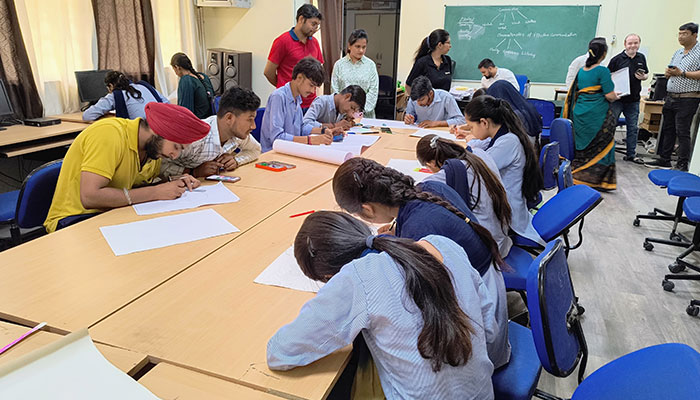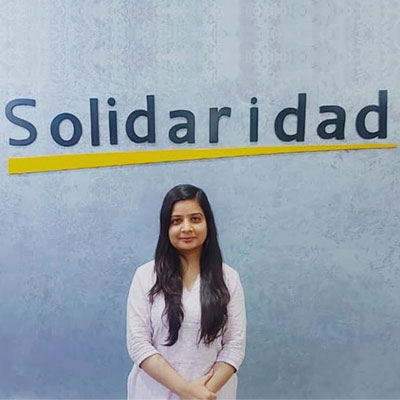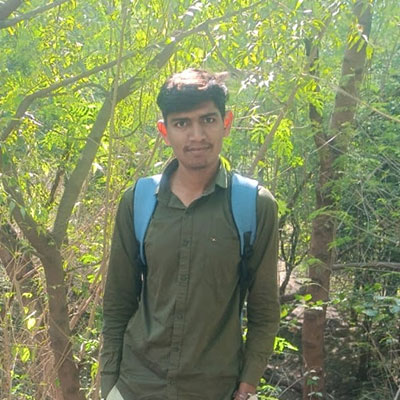Issue/Volume: 20/02

In June, Solidaridad’s Executive Director Andre de Freitas visited key project locations during his maiden visit to India. The month also saw several activities and events across different states to honour the essence and cause of World Environment Day. As we cap off the first half of 2024, we also take a look at some remarkable instances of farmers scripting their own stories of change that matters.
Happy reading!

Solidaridad ED takes stock of leather and tea programmes in India
What are the goals and motivations that inspire Solidaridad to work harder in advancing the cause of sustainability in agriculture and MSME sectors? This pertinent question formed the crux of fruitful conversations held in Kolkata on 4–5 June 2024, as Solidaridad’s Executive Director (ED) Andre de Freitas met with key stakeholders from the leather and tea sectors.
On 4 June, Andre met with representatives of the Indian Tea Association – Chairman Hemant Bangur, Vice-Chairman Sunil Sikand, Additional Vice-Chairman Atul Rastogi, and Nayantara Palchoudhuri, Chairperson of the Tea Research Association (TRA Tocklai) and Asia Tea Alliance – to discuss the nature of its collaboration with Solidaridad over the past five years. Acknowledging the challenges and opportunities, Shatadru Chattopadhayay, Managing Director, Solidaridad Asia, highlighted the importance of regenerative practices in the tea sector, and offered support to set up pilot programmes in different geographies to better demonstrate the advantages of the practices to the small-scale farmers.
The following day, Solidaridad’s leather team in the Bantala cluster, Kolkata, provided Andre with key insights on the project, its impact and vision for the future. Andre and Shatadru also inaugurated a solid waste management site-cum-training centre, where knowledge on effective techniques of transforming waste to value-added products will be imparted to workers.

In Madhya Pradesh, Solidaridad ED inaugurates Model Regenerative Village
In the second leg of Andre’s India tour, he along with Shatadru and India Country Manager Monika Khanna visited Madhya Pradesh to engage with various agricultural initiatives and stakeholders. Their visit commenced with the inauguration of the Model Regenerative Village in Napakhedi, Dewas district. This village now serves as a pioneering example of sustainable agricultural practices and community development.
Following this, Andre inaugurated the Bharatkhand Krishi Bazaar in Phanda village, Bhopal district. The Bazaar is a marketplace aimed at supporting local farmers by providing a platform for the sale of their produce, thereby promoting economic growth within the community.
The visit concluded with a town hall in Bhopal. The highlight of the event was a symposium titled “Partnering for Progress: Enhancing Food Security and Achieving Sustainable Development Goals (SDGs) Through Smart and Regenerative Agriculture”. The symposium featured discussions between Andre, Shatadru, and Suresh Motwani of Solidaridad, along with other esteemed partners from various industries. This collaborative dialogue underscored the importance of integrated efforts in promoting sustainable agricultural practices and ensuring food security.

Enabling safer workplaces in Tamil Nadu’s leather sector
In a significant move to bolster workplace safety, Solidaridad’s leather team in Tamil Nadu conducted four comprehensive occupational health and safety (OHS) programmes in May, directly benefiting 125 employees.
The primary focus of these interactive training sessions was to raise awareness about hydrogen sulphide (H2S) gas, how to detect it, and the correct usage of personal protective equipment (PPE). Given the hazardous nature of the H2S gas, it is crucial to support workers with knowledge on taking appropriate safety measures to prevent accidents.
Another insightful aspect was the use of pre-assessment forms to gauge the awareness of safety practices among workers. The findings revealed that most workers were not utilising PPE kits correctly at their workplaces. However, these assessments also showed a positive shift in their attitudes, post-training. They acknowledged the crucial role of PPE, and demonstrated a willingness to use the equipment correctly.

Biochar demonstrations earn farmers’ approval
Towards the end of May, Solidaridad conducted farmers’ training on the preparation of biochar – a carbon-rich, charcoal-like substance that can retain water and nutrients in the topsoil, improving its quality and leading to better yields for farmers. The session, attended by 48 farmers, was held on the demo plot of Narayan Choudhary, a lead farmer under the Smart Agri Project, in Susundri village, Nagpur district, Maharashtra. The goal: to help farmers reduce production costs, improve their yields while taking care of the soil, and aid in carbon sequestration on their farms. Narayan demonstrated the process of preparing biochar, highlighting its benefits, and the process of application.
A similar demonstration was also carried out in Tirzada village, Yavatmal district, Maharashtra, during the same period.

Organic farming standards and practices discussed in awareness drives
Organic standards outline the prerequisites and essentials for agricultural production in harmony with nature. In Maharashtra, Solidaridad’s cotton team recently organised awareness sessions on organic standards at Amla Vishweshwar village (in Amravati district) and Mangaladevi village (in Yavatmal district). Solidaridad staff discussed the need and importance of organic practices, bio-inputs, and integrated pest management.
Non-GMO cotton seeds were also recently distributed among the farmers at multiple locations in the state. At the same time, discussions and lessons on seed treatment, GAPs, preparation of bio-inputs, and reducing use of chemicals – all measures that can significantly ease the financial burden of farmers – were well-received by participants.

Equipping women with knowledge on good farming practices, nutrition gardens
Earlier this month, in Chinchpur village in Maharashtra, Solidaridad staff guided women on good agricultural practices (GAPs), health and nutrition, mushroom cultivation, nutrition gardens and their role in improving the nutritional status of families. In addition to this, the experts also instructed the participants about the utility and use of the Smart Agri advisory application, as well as the preparation and application of vermicompost in fields. The training, it is hoped, will enable women to develop their skills and make use of supplementary livelihood options.

Supporting farmers to adopt the ‘smart’ way of agriculture
Solidaridad’s State Resource and Training Centre in Kalmeshwar block, Nagpur district, Maharashtra, provides a platform for farmers to interact with and learn from each other, besides gaining expertise from agriculture experts. In May, two such training sessions were organised for farmers. At the sessions, Solidaridad staff and experts lent support to the farmers by sharing useful knowledge and crucial insights on various topics: GAPs, water conservation, land preparation, making bio-inputs such as vermicompost, planning sowing and irrigation schedules, as well as other activities such as spraying and soil testing. The team also provided demonstrations of the Smart Agri application’s real-time monitoring of crop and weather conditions, and the updates farmers receive on their phones.

Financial literacy takes centrestage in workshops for women
Together with Umed – Maharashtra State Rural Livelihood Mission, Solidaridad conducted a one-day workshop for women in May. The assistant block development officer from Saoner block, Nagpur district, and Umed’s block coordinator attended this workshop which focused on financial literacy and training on GAPs, supporting women to make informed decisions, manage their earnings efficiently and improve their livelihoods. The participants gained insights on concepts such as financial budgeting and borrowing, and their importance. The Umed team discussed different low-interest loans, subsidies, and low-cost equipment and inputs available to the women. The team also informed the participants about the financial risks associated with agriculture, and the insurance and savings strategies that can offer protection against such risks. The digital component of this workshop focused on training women in the use of the Smart Agri mobile app to help plan farming activities. A similar session was held in the same month in Khairi (Lakhama) village in the Kalmeshwar block. It generated awareness on GAPs, health and nutrition, and sources of additional income, such as mushroom farming and kitchen gardening.
On 5 June, in many states across India, Solidaridad organised events to celebrate the importance and spirit of World Environment Day. Here, a few snapshots:

Tamil Nadu
An event held in Ambur reinforced Solidaridad’s commitment to foster sustainable and circular practices in the leather industry. The event – attended by over 80 representatives from tanneries and tanners’ associations in the region, the state government, and companies (such as AMBURTEC) – underscored the importance of collaborative efforts in addressing environmental challenges.
Led by Dr Ravindranath, a senior consultant with Solidaridad, the event began with an in-depth briefing on various Solidaridad initiatives in the leather sector. Dr Ravindranath outlined the challenges encountered and the novel approaches implemented for the management of solid waste. This was followed by an interactive session where participants shared their experiences of dealing with waste management in tanneries and the leather sector, leading to a rich dialogue and knowledge-sharing between the multiple stakeholders who continue to drive forward efforts at ensuring sustainability and a circular, green economy.

Gujarat
More than 400 farmers from Gujarat’s Banaskantha and Sabarkantha districts came together to commemorate World Environment Day on 5 June 2024. The farmers are all actively engaged in the sustainable castor initiative known as Pragati. The occasion provided an opportunity for the farmers to showcase their dedication towards modern, environment-friendly agricultural practices. Through discussions and activities, the farmers shared their insights, strategies and experiences on how they preserve their land for generations to come. Besides serving as a call to action, the conversations around regenerative, resource-efficient agriculture exemplified the profound impact that grassroots and community-driven initiatives have on environmental stewardship, and in crafting a sustainable, resilient future for all.

Uttar Pradesh
On 5 June 2024, in Hardoi, 95 sugarcane farmers took a pledge, committing themselves to protecting the environment. The event championed the implementation of sustainable practices, with Solidaridad experts highlighting the importance of environmental awareness and the sustainable management of natural resources. The conversations also touched upon the impacts of climate change, soil health and water management, and the critical role of practices such as drip irrigation, using organic fertilisers and soil health management. Farmers enriched the discussions by sharing inspirational success stories, while an interactive session shed light on available policies and support systems.In keeping with this year’s theme of land restoration and building drought resilience, the day also saw a community-led tree-planting drive that served as an illustration of the vital link between humans and nature. During the activity, farmers stressed upon the importance of air, water, and soil, and warned against prioritising urban development over environmental well-being.

Maharashtra
On 5 June, awareness drives were held in all the seven districts of Maharashtra where Solidaridad’s projects have been implemented. Conducted in collaboration with different agriculture departments, Krishi Vigyan Kendras (KVKs), farmer producer organisations (FPOs), and research institutes, the sessions provided useful insights to the farmers on the factors influencing climate change, the importance of biodiversity, GAPs, waste management, water conservation, soil health management, carbon sequestration, and the adverse effects of conventional farming activities. The events also included tree-planting activities and the distribution of non-GMO seeds, to further spread awareness on sustainable agriculture. The events at different locations saw participation from a host of stakeholders – farmers, gram panchayat staff, FPO members, rural development officials, taluka krushi adhikaris, block officers of the Maharashtra State Rural Livelihood Mission, and more.

Haryana
On World Environment Day, Solidaridad joined hands with the enthusiastic students and staff of the Govt. Industrial Training Institute (ITI), Panipat, to transform the ITI campus into an ‘oxy zone’ by planting saplings of different varieties of trees. A poster-design competition and an interactive session were also organised, to foster awareness and instil a sense of responsibility towards the environment. The shared commitment to safeguarding the planet was well-reflected in the oath taken at the end of the event: “Let’s continue planting seeds of change and nurture them with care, ensuring a brighter tomorrow for generations to come.”

Reviving waterlogged land, unlocking agricultural potential
The Solidaridad project in Sangli, Maharashtra , stands as a testament to how innovative solutions can revive waterlogged land. It employs the subsurface drainage system (SSD) to effectively address long-standing waterlogging and soil salinity issues, thereby unlocking the region's agricultural potential. Collaborative efforts under the sugarcane project promise significant benefits for growers . By working towards water conservation, integrating advanced technology, and fostering farmer engagement, the project promotes sustainable agricultural practices. Meticulous planning and execution, supported by Dalmia Bharat Sugar, have led to transformative outcomes. The reclaimed land, it is hoped, will have thriving sugarcane fields, enhancing farmer incomes. Santosh Kumbhar, Head of Dalmia Bharat’s Ninaidevi unit, lauds the project as a beacon of hope, showcasing the potential of collaboration and innovation.

Turning over a new leaf
Amal Roy Dakua owns 20 bigha (around 2.67 hectares) of land in Jamaldaha village, Cooch Behar district, West Bengal, on which he cultivates tea, dragon fruit and (more recently) sandalwood (chandan). However, due to a lack of proper technical assistance, he was faced with rising and steep fertiliser and chemical input costs.The Smart Agri Project filled this gap by supporting him with knowledge of GAPs, as well as the weekly crop and weather advisories provided by the project’s app. As a result, Amal’s farm is now thriving. The dragon fruit (which he planted for the first time in 2022) yielded him 5 quintals of ripe produce in 2023, which he was able to sell at the rate of ₹300 per kg . Currently, he is growing around 1,200 dragon fruit plants, each of which produces 7 kilograms of the fruit. Amal also produces vermicompost on his farm.
Amal hopes to further diversify his activities by setting up a nursery. He also aspires to be a role model for his fellow farmers in the village.

A turnaround in fortunes
Narayan Santosh Choudhary owns 5 acres of land in Susundri village, Kalmeshwar block, Nagpur district, Maharashtra. Today, he is an inspiring lead farmer under the Smart Agri Project, but till a few years ago, his situation was a grim one. Struggling with unpredictable weather patterns and deteriorating soil (with high levels of acidity and low productivity), Narayan stared at a bleak future, punctuated by low yields, increasing expenditure on chemical inputs, rampant insect and pest attacks, and overall poverty.
It was only in 2020 that things changed for the better when he came to know of the Smart Agri Project after attending a Solidaridad training session on GAPs. In the years that followed, the Smart Agri Project has supported Narayan in multiple ways:
Before joining the Smart Agri Project, his net annual income used to be ₹1 lakh. By 2023–24, the figure had more than doubled to ₹2.52 lakh. The current yields are also impressive – 23 quintals of cotton, 7 quintals of soy, and 2 quintals of pigeon pea. Moving forward, Narayan hopes to encourage his fellow villagers to embrace his practices, and help them carve their own sustainable futures.

Nikita Sethi
Program Associate, Dairy

Ghugha Soyabali
Field Coordinator, Jamnagar, Gujarat